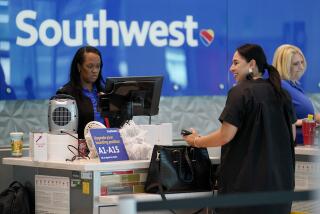Travel Trade in a Tailspin After Crisis
With Americans spooked of flying and U.S. airlines speeding toward insolvency, the nation’s travel and tourism industry is bracing for massive cutbacks in the wake of last week’s terrorist attacks.
By one estimate, as many as 625,000 jobs could be lost industrywide, as canceled trips and postponed conventions lead to idled rental cars, empty hotel rooms, vacant cruise-ship cabins, wide-open restaurants and quiet casinos.
“It’s severe,” said Richard Copland, president and chief executive of the American Society of Travel Agents, whose membership roster tops 20,000 and offers employment to more than 400,000 people. “These are small businesses,” he said, that “don’t have the wherewithal or cash assets” to survive a lengthy downturn.
At the center of the crisis are the nation’s beleaguered airlines, which deliver 650 million passengers annually to the rest of the industry. With bookings plummeting, carriers are already slashing flight schedules and jobs to survive. Continental Airlines, for example, has furloughed 12,000 employees and said it will end flight service to 10 U.S. cities.
Some travelers will simply switch to their cars and others will return to the skies once the initial terror of last week has subsided. But analysts said sickness in the airline industry is a sign of things to come for the rest of the travel industry, which employs nearly 8 million Americans.
The airlines “are the lead dog,” said Kevin Mitchell, chairman of Business Travel Coalition, an advocacy group that lobbies on behalf of corporations with significant travel budgets. He predicted that deteriorating economics at the nation’s airlines will result in the loss of 125,000 jobs, with an additional 500,000 jobs lost in such supporting industries as lodging, restaurant and casino businesses.
“When they go down, everything goes down,” Mitchell said.
Travel and tourism is considered the third-largest employment sector in California as well as in the nation, generating $75 billion in annual revenue in the state and $582 billion nationwide. In California, 1.1 million people work in the industry, according to state officials and trade groups.
“We’re in for a rough patch, there’s no question about it,” said Michael Collins, executive vice president of the Los Angeles Visitor and Convention Center.
Much of the loss in Los Angeles and around the country is expected to come from business, as corporations--already squeezing travel budgets because of the slowing economy--react to the terrorist attacks.
“One characteristic of a booming economy is the high mobility factor in business,” said Rolfe Shellenberger, a former American Airlines executive who is now a travel consultant with Runzheimer International. “People would think nothing of going overnight to Paris to meet with someone for two hours and then flying back. That kind of pace is not going to return.”
Some critics, including organized labor, said the airlines are exaggerating their financial woes to make a play for a government bailout, while wringing concessions from their workers. Louis Ramos, a Teamsters Union driver at Los Angeles International Airport whose company provides in-flight meals for the carriers, said chances for raises just evaporated.
But tourist and travel businesses insisted the pain is real. Hotel occupancy in Las Vegas averaged 67%, or about 175,000 visitors, this past weekend. This time of year, Las Vegas hotels are typically 94% booked with 250,000 visitors, according to Las Vegas Convention and Visitors Authority spokesman Rob Powers. Las Vegas last year hosted 35.8 million visitors, nearly half of whom arrived by airplane.
“There’s no question we’re already seeing a decline in business,” Powers said.
Although airlines are building up their travel schedules, uncertainty has caused a number of business groups to cancel or postpone conventions--the big-money events that keep everyone from bellhops to bartenders fed in tourist towns.
Organizers of the International Vision Expo scheduled for next week at the Sands Expo and Convention Center in Las Vegas have canceled that event, citing the “inability of huge numbers of the optical community to travel to and within the U.S.” The loss of those 18,000 conventioneers will cost the Las Vegas economy an estimated $25 million, Powers said.
Other convention magnets have been similarly affected. The National Business Aviation Assn. abruptly canceled its three-day convention in New Orleans that would have brought 30,000 visitors. Ditto for this week’s California Dental Assn. convention in San Francisco, which was slated to attract 15,000 participants.
“It doesn’t take too many hits before a particular market, in this case the Bay Area, is really impacted” said Jim Abrams, president of the California Hotel & Lodging Assn. But, he cautioned, “What transpires in the next three weeks is going to be a better, longer-term gauge.”
Leaders of the travel and tourism industries warn of greater pain down the road if revenues plunge.
Bev Zukow, of Villa Park-based First Travel of California, said about 75% of her clients scheduled to leave in the next few weeks have canceled trips; Zukow waived all cancellation fees.
“We can’t blame the traveling public for wanting to cancel, so there’s a moral issue for charging them for the dilemma we’re in,” she said. “We’ve spent more time refunding and canceling in five days than I’ve done in five years.”
The biggest hit is most likely over, since airlines are operating again. But the expected cutbacks in service and layoffs will probably damage businesses like Zukow’s for months to come.
“It’s a trickle-down effect on cruises, on tours, on anything,” Zukow said.
The travel agent already has redirected one family of would-be European travelers to a road trip through Northern California’s wine country. And the state lodging associations’s Abrams said he expects more car travel to California from such states as Idaho, New Mexico and Oregon.
But those changing habits will still bite into profits.
“There’s only so many car and train trips you can plan, and that’s not lucrative for us,” said travel agent Zukow. “Specialized trips are where our business is.”
The sudden vulnerability of the industry underscores its dependence on the airlines. The airlines and travel industry make strange bedfellows because agents have been battling the airlines, which have reduced travel-agent commissions.
Now, the two adversaries find themselves side by side on Capitol Hill, clamoring for a government bailout. Three of Copland’s lobbyists have been hustling on the Hill since last week, frantically hoping to ensure that agents are taken into account if government assistance flows to the airline industry.
“What we’re facing is simply unprecedented,” confirmed Steve Loucks, spokesman for Minneapolis-based Carlson Wagonlit Travel, the nation’s second-largest travel agency. Travel agents polled in some of his companies’ 1,100 U.S. offices said they expected more than a quarter of their business travelers to remain grounded for an extended period.
Although Mitchell of Business Travel Coalition predicted up to 625,000 jobs could be lost, other experts warned it is too soon to measure the long-term impact.
Many consumers have simply postponed trips, agreeing to forgo refunds in exchange for future travel. Barb Huston, co-owner of Indianapolis-based Golf Tours & Travel Company, for example, has seen most clients hold on to travel packages for the Ryder Cup, the international golf tournament rescheduled for next year in the wake of the tragedy.
Some analysts see possible positive results from the crisis, including bargain prices. “In the long run, this is really going to be good for consumers,” said Terry Trippler, airline analyst for the travel Web site https://www.Onetravel.com.
Times staff writers Tom Gorman, Bonnie Harris, Greg Johnson, James Flanigan, Christopher Reynolds, Melinda Fulmer, Leslie Earnest, Nancy Cleeland, Peter Pae, Abigail Goldman and Karen Robinson-Jacobs contributed to this story.
More to Read
Inside the business of entertainment
The Wide Shot brings you news, analysis and insights on everything from streaming wars to production — and what it all means for the future.
You may occasionally receive promotional content from the Los Angeles Times.











